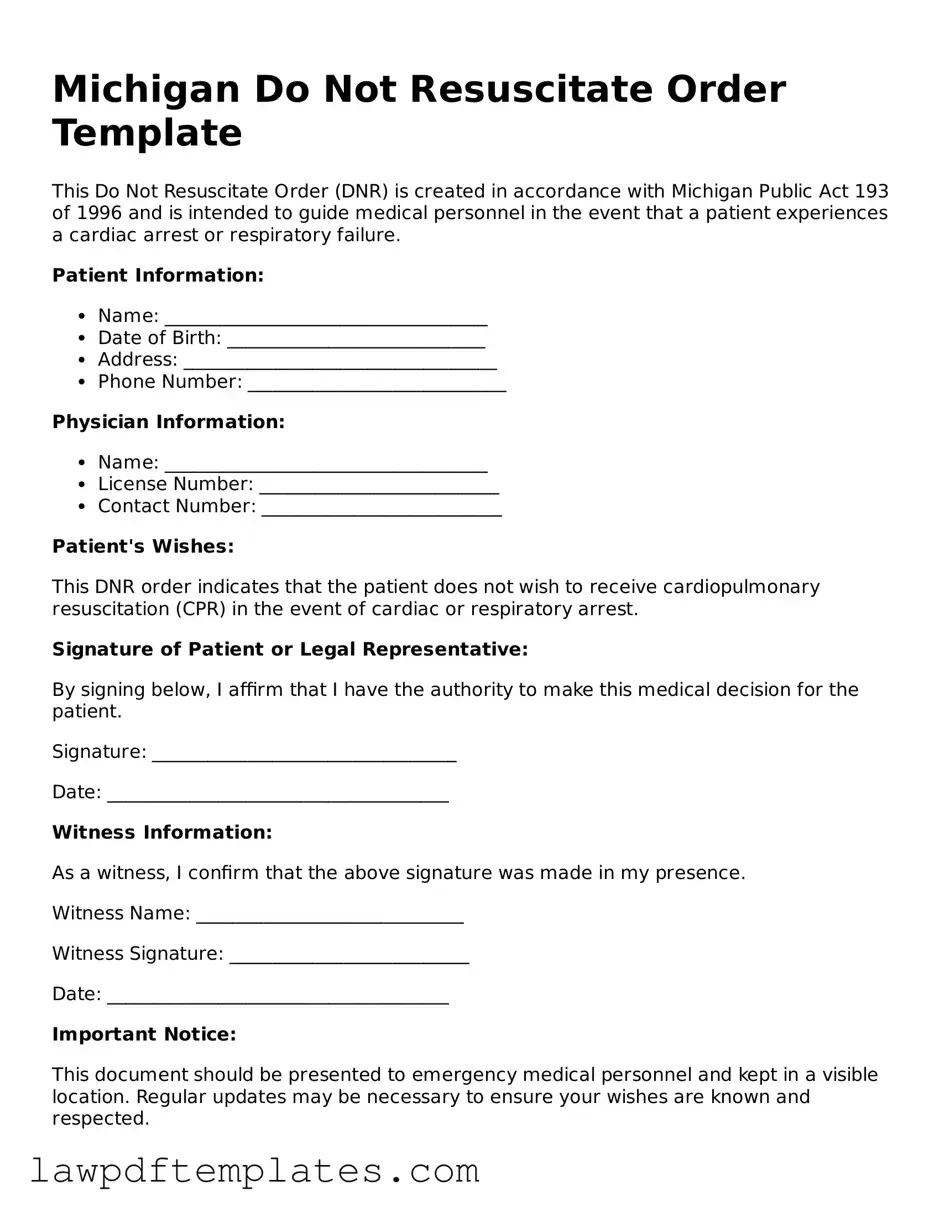Free Do Not Resuscitate Order Template for the State of Michigan
Form Breakdown
| Fact Name | Description |
|---|---|
| Definition | The Michigan Do Not Resuscitate (DNR) Order is a legal document that allows individuals to refuse cardiopulmonary resuscitation (CPR) in the event of a cardiac or respiratory arrest. |
| Governing Law | The DNR Order in Michigan is governed by the Michigan Public Health Code, specifically MCL 333.1051 to 333.1055. |
| Eligibility | Any adult capable of making their own medical decisions can complete a DNR Order. |
| Signature Requirement | The form must be signed by the patient, or by a legally authorized representative if the patient is unable to sign. |
| Healthcare Provider's Role | A physician must sign the DNR Order for it to be valid, indicating that the patient has been informed of the implications. |
| Revocation | The DNR Order can be revoked at any time by the patient or their representative, verbally or in writing. |
| Emergency Medical Services | EMS personnel must honor a valid DNR Order and refrain from performing CPR when it is presented. |
| Placement | The DNR Order should be kept in an easily accessible location, such as with the patient's medical records or on their person. |
| Form Availability | The Michigan DNR Order form is available online through the Michigan Department of Health and Human Services website. |
| Additional Considerations | Patients should discuss their DNR Order with family members and healthcare providers to ensure understanding and compliance. |
Sample - Michigan Do Not Resuscitate Order Form
Michigan Do Not Resuscitate Order Template
This Do Not Resuscitate Order (DNR) is created in accordance with Michigan Public Act 193 of 1996 and is intended to guide medical personnel in the event that a patient experiences a cardiac arrest or respiratory failure.
Patient Information:
- Name: ___________________________________
- Date of Birth: ____________________________
- Address: __________________________________
- Phone Number: ____________________________
Physician Information:
- Name: ___________________________________
- License Number: __________________________
- Contact Number: __________________________
Patient's Wishes:
This DNR order indicates that the patient does not wish to receive cardiopulmonary resuscitation (CPR) in the event of cardiac or respiratory arrest.
Signature of Patient or Legal Representative:
By signing below, I affirm that I have the authority to make this medical decision for the patient.
Signature: _________________________________
Date: _____________________________________
Witness Information:
As a witness, I confirm that the above signature was made in my presence.
Witness Name: _____________________________
Witness Signature: __________________________
Date: _____________________________________
Important Notice:
This document should be presented to emergency medical personnel and kept in a visible location. Regular updates may be necessary to ensure your wishes are known and respected.
Common mistakes
Filling out the Michigan Do Not Resuscitate (DNR) Order form can be a crucial step in expressing one's healthcare wishes. However, many individuals make common mistakes that can lead to confusion or unintended consequences. Understanding these pitfalls can help ensure that the form is completed accurately and effectively.
One frequent mistake is failing to provide clear identification. It’s essential to include the full name, date of birth, and other identifying information of the patient. Without this information, healthcare providers may struggle to confirm the order's validity, potentially leading to unwanted resuscitation efforts.
Another common error is neglecting to sign the form. The DNR Order must be signed by the patient or their legally authorized representative. If the signature is missing, medical personnel may not recognize the document as valid, which could result in actions contrary to the patient's wishes.
Some people mistakenly assume that the DNR Order only needs to be filled out once. In reality, it’s important to review and update the form regularly, especially if there are changes in health status or personal preferences. Failing to do so may leave outdated instructions that do not reflect current wishes.
Inaccurate completion of the medical provider's section is another significant issue. This section must be filled out by a licensed physician. If the physician does not complete their part correctly, the order may not be honored in a medical setting. Always ensure that the healthcare provider has signed and dated the form appropriately.
Misunderstanding the implications of a DNR Order can lead to confusion. Some individuals may think that signing a DNR means they will receive no medical care at all. In fact, a DNR Order specifically pertains to resuscitation efforts and does not prevent other forms of medical treatment from being provided.
Moreover, not discussing the DNR Order with family members can create unnecessary distress during a medical crisis. Open communication about end-of-life wishes is vital. Family members should be aware of the DNR Order and understand its implications to avoid conflicts or confusion when the time comes.
Lastly, failing to keep copies of the DNR Order in accessible locations can pose significant challenges. It’s advisable to keep a copy at home, provide one to the patient’s primary care physician, and ensure that family members have copies as well. This way, the order can be easily located and presented in emergencies.
Discover More Do Not Resuscitate Order Templates for Specific States
Dnr Directive - Having a DNR can lead to clearer communication between healthcare providers and families during emergencies.
For individuals looking to enter into a lease, understanding the Georgia Residential Lease Agreement form process is crucial to ensure compliance with local laws and protection of both landlords and tenants. This form helps define obligations and rights, facilitating a smoother rental experience.
Dnr Do Not Resuscitate - Should be reviewed periodically as health conditions change over time.
